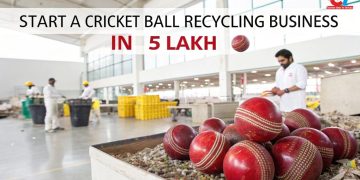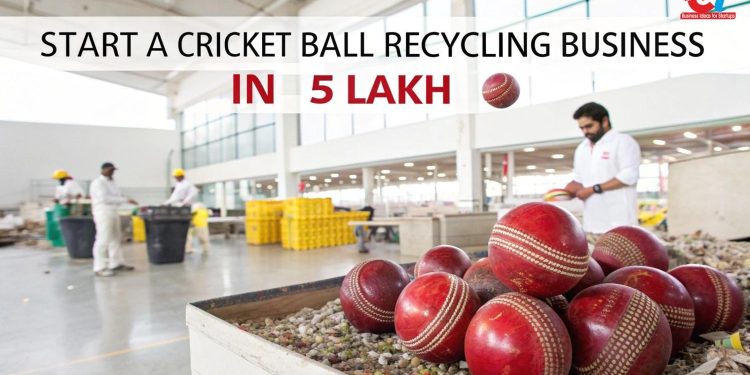Cricket is a passion of millions in India, not just a sport. Cricket is played everywhere from jam-packed metropolitan stadiums to sleepy town fields. And regardless of whether it’s a match, a practice session, or a tournament, one crucial piece of equipment is always needed—the cricket ball. Yet, very few people ponder over what happens to these balls when they become obsolete.
Once the bounce, shine, or seam of thousands of cricket balls in India gets worn out, they are mercilessly thrown away. The majority of these balls are either dumped in landfills or discarded and forgotten in clubhouses. Used cricket balls still have life left in them, even if a lot of people are unaware. In fact, the market for recycling old cricket balls is emerging as an intelligent, eco-friendly, and lucrative business opportunity.
This article aims at providing a clear step-by-step plan for entrepreneurs looking to exploit this overlooked sector. It covers everything from how to obtain used balls, their method of recycling or repurposing, and the expected profits.
The Recycling of Old Cricket Balls: Its Economic Benefits
Cricket balls are composed of quality materials with genuine leather, cork, layers of rubber, and strong stitching. They are expensive to make, yet their use is restricted to a few matches. The grip will loosen, the seam will fade, and the bounce will get worse with every match played, so cricket balls have a very limited operational lifespan.
Regardless, their internal structure frequently remains intact. By refurbishing them to a minimum level and polishing them, it is possible to make old cricket balls into usable practice balls or even into novelty items. This technology creates new opportunities for providing low-priced sports equipment and appealing new artifacts.
As the trend of sustainable ventures increases, the recycling of old cricket balls is a step in the right direction towards lowering waste, encourages reuse, and spins the wheel of circular economy in the sports field. The idea is appealing in terms of ecology and aesthetics.

Obtaining Expired Cricket Balls for Reusing Purposes
A winning strategy in the business of cricket ball recycling is to ensure a dependable supply network. The cricket academies, coaching centers, sports clubs, school sports divisions, and local cricket associations are the primary providers of old balls. These establishments tend to throw away these balls after a few uses as it is the norm to use only a few standard balls during training and matches.
Engaging them with buying-back deals and collection partnership offers as a means of obtaining raw materials has proven to be cost-effective. To them, being paid a nominal fee or receiving reconditioned products in exchange for stock would be appealing.
Social media campaigns and collection drives aim to motivate them to sell or give away old game balls rather than discarding them. They include casual cricketers, local sports fans, or even the parents of young players.
Consider exploring retailers and sport shops since they sometimes have outdated stock, unsellable items due to damage, or branded items deemed old.
Related: Understanding Quality Standards in Leather Cricket Balls: A Strategic Guide for Startups
The Recycling Process: Recondition, Repurpose, Resell
The classification of activities involved in recycling used cricket balls can roughly categorized into two processes: reconditioning them towards practical use and repurposing them for arts and crafts.
Reconditioning Process
In a reconditioning procedure, the ball’s surface is cleaned with the aim of removing dust, mud, and corrosion residue, if any. So that the leather remains supple, conditioners designed for leather goods are applied. Subsequently, the leather is polished anew using either natural wax or commercial ball polish. Hand-stitching may be done to the seam in order to enhance the ball’s grip structural integrity. The goal is to enhance the ball’s condition so that it can be used for practice, coaching drills, or sessions in a net.
Repurposing Process
Balls that incur excessive damage and cannot ideally be reconstructed with other techniques are labeled as damaged for other ball parts. The outer layer of leather can be separated from the inner cork core. Earmuffs, keychains, wallets, coasters, and rustic home decor items can be created from cut leather patches. Such items, mainly made for customization with a player’s name or team logo, are marked novelty for cricket fans.
Some companies also create themed gift boxes and cricket souvenirs incorporating old parts of the ball as mementos. This segment especially does well on online stores as well as at merchandise stalls during tournaments where cricket fans gather.
Arranging the Unit: Equipment and Labour
The setup for a cricket ball recycling business is straightforward, as it does not have heavy infrastructure or costly machinery prerequisites. The operation can be started in a small workshop or home-based unit, commencing with a few workbenches, hand tools, brushes, polishers, and leather conditioners.
If seam repair or other more intensive refurbishing work is needed, a leather sewing machine may be required. Additional equipment may include buffing and sanding machines for surface finishing to make higher-grade practice balls. Certain retail sales packaging such as branded stickers, paper boxes, and product tags also need to be procured.
Unlike machines, skilled hands are more essential. Employees with experience in working with leather goods such as stitching or light product assembly will be easy to train for old cricket ball refurbishing. Depending on the scope of work, hundreds of balls per week can be processed with a team of three to five members.
Financial Backing and Economic Viability
For modest setup requirements, the preliminary expenditure is quite low, approximately ₹3 to ₹5 lakhs. The budget will also account for equipment, wage, admission of marketing materials, and the raw materials.
The price of refurbished cricket balls is between ₹60 and ₹100, relative to their quality. New match-grade balls on the other hand, cost ₹500 or more. The price for recycled balls makes them useful for practice sessions or local clubs, and even rural schools with limited funding for sports.
Novel items like cricket ball keychains and ornaments can sell anywhere from ₹150 to more than ₹500 depending on the level of customization. This generates even greater profits.
With constant procurement, the monthly revenue is between ₹1.5 to ₹3 lacs through strong local or online sales. With consistent streamlined processes and strong sales outlets, the profits would net 30–40 percent in profit margins. It’s realistic to become sustainable in under a year.
Related: Top 10 High-Demand business ideas for Indian Entrepreneurs in 2025
Social and Sustainable Impact
What truly differentiates the business from others in the market is the social and sustainable impact, and for profits you name the price to subsidize overpriced balls floods landfills. You are reducing leather pressure and extending the lifespan instead. This enables positioning the brand as environmentally conscious, showcasing great appeal for modern consumers.
You can get into partnerships with cricket NGOs, CSR projects, and government initiatives aimed at small business industrial development, sport, or sustainable business. Schools and educational institutions are likely to be more supportive of the proposal when combined with an eco-friendly argument.
With the right branding strategy that focuses on reusability and recycling while still marketing the sport effectively, it is easy to attract and inspire cricket lovers on an emotional level.
How NPCS Can Support Your Venture
Starting a business—even a small one—requires planning. That’s where Niir Project Consultancy Services (NPCS) can make a big difference.
With decades of experience in preparing Detailed Project Reports (DPRs), feasibility studies, and market analysis documents, NPCS can help you:
- Understand market demand and competitor pricing
- Design the processing unit layout
- Choose the right equipment and suppliers
- Calculate cost analysis and profit projections
- Prepare business proposals for bank loans or investors
This support ensures that your cricket ball recycling business is built on a solid foundation.
Conclusion: Turning Discards into Opportunities
The recycling of old cricket balls is a business model that aligns passion with purpose. It doesn’t just give new life to a discarded object—it empowers local entrepreneurs, offers affordable training gear to young players, supports sustainable practices, and creates meaningful products for fans.
Whether you’re an eco-conscious entrepreneur, a sports equipment reseller, or simply someone looking to start a purposeful venture with low capital, this niche has promising potential.
With smart sourcing, efficient processes, and creative branding—and with guidance from organizations like Niir Project Consultancy Services—you can build a business that scores big in both profits and purpose.


















